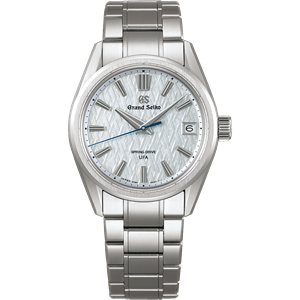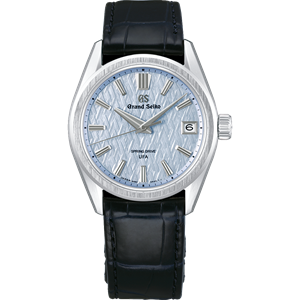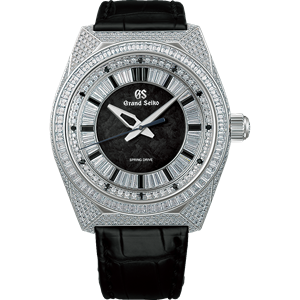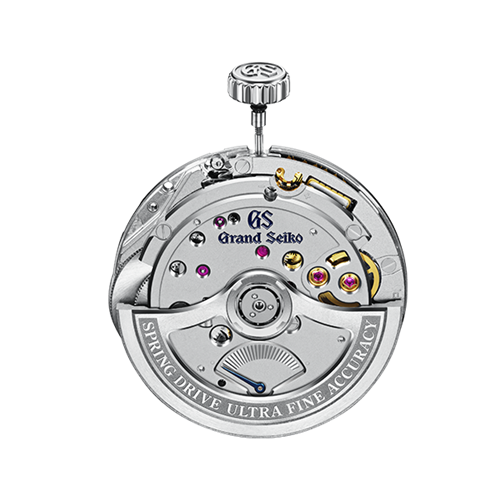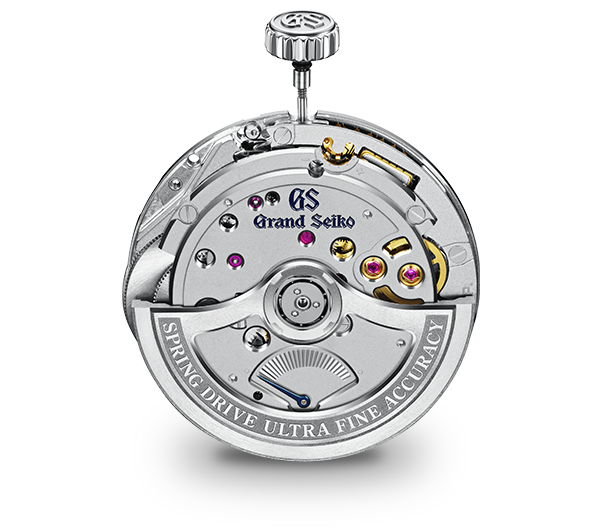
9R Spring Drive
Spring Drive is a unique watch technology. It generates energy like every other luxury mechanical watch but combines this with an electronic regulator to deliver a level of precision that no mechanical watch can match.
The development of Spring Drive was possible because Grand Seiko is one of the very few manufacturers with mastery of both electronic and mechanical watchmaking.Bringing together mechanical
and electronic watchmaking for the best of both worlds.
The two key elements behind the function of any watch are its power source and its time control system.
Spring Drive is a unique movement that combines the high torque of a mechanical watch with the high precision integrated circuit (IC) control system of an electronic watch.
| Power source | Control system | |
|---|---|---|
| Mechanical watch | Mainspring High torque (motive force driving the watch) |
The wound-up mainspring exerts force to turn gears at a set speed as it unwinds, while the speed control and escapement mechanism consisting of the balance, pallet, and escape wheel govern overall precision. While precise. even the most accurate Grand Seiko models cannot compete with the accuracy of a quartz watch, with a daily rate of +8/-1 seconds. |
| Quartz watch | Battery Lower torque compared to a mechanical watch |
The battery sends electricity to a quartz oscillator, whose precise vibrations are detected by an integrated circuit (IC). The IC then moves the gears forward by exactly one second. The precision control of the IC allows for a high standard of accuracy, with Grand Seiko quartz models achieving a yearly rate of ±10 seconds. |
Powered by the mainspring
Spring Drive is powered by a mainspring, just like all other mechanical watches. This traditional way of generating power allows the watch to be entirely autonomous, with no need for a battery or other power source.
Winding the mainspring by turning the crown or by moving the wrist stores energy which is then transferred to gears and used to move the watch hands as the spring unwinds over time.
By taking advantage of the high level of torque afforded by the mainspring, the caliber needs no other power to move the long, wide hands in the smooth glide motion that is Spring Drive’s signature.
Tri-Synchro Regulator
Spring Drive utilise un mécanisme exclusif de contrôle de la vitesse qui comprend un circuit intégré, un frein électronique et un cristal de quartz.
Sans mécanisme d’ajustement de la vitesse à laquelle le ressort-moteur se désarme, il se déroulerait rapidement et la montre s’arrêterait soudainement. Pour parvenir à mesurer le temps avec précision, un mécanisme de contrôle du ressort-moteur est nécessaire.
Le régulateur tri-synchro développé par Seiko remplit cette fonction.
Comme le laisse entendre son nom, le régulateur tri-synchro utilise trois types d’énergie pour réguler les pièces mobiles et assurer la synchronisation :
- Énergie mécanique, produite par le ressort-moteur
- Énergie électrique, créant un signal de référence par le biais d’un circuit intégré et d’un oscillateur à quartza
- Énergie électromagnétique, pour appliquer un frein à l’aide d’un rotor et d’un stator.
Ces trois forces travaillent en harmonie, afin de réguler le ressort et permettre le mouvement précis de l’aiguille des secondes.
1. MECHANICAL POWER
Generating electrical power from the unwinding mainspring
Spring Drive uses a system identical to that of a pedal-powered bicycle light to generate electrical power. A rotor connected to the end of the gear train acts together with a stator wound by wire to generate power. In a Spring Drive watch, the rotor, or glide wheel, makes eight full revolutions every second, generating a slight electric current.
2. ELECTRICAL POWER
Transmitting a precise signal through a quartz crystal oscillator
The electrical power generated by the glide wheel is used to activate a quartz oscillator and IC.
The quartz oscillator vibrates at exactly 32,768 Hz, transmitting a precise reference signal to the IC.
3. ELECTROMAGNETIC POWER
Applying the brake to control speed
The IC compares the reference signal from the quartz oscillator with the revolution speed of the glide wheel, and intermittently applies a magnetic brake when it detects that the glide wheel is operating too fast. This regulation of the glide wheel is transmitted to the gear train, ensuring that the watch hands move with precision.
Master craftsmanship in assembly and adjustment
Spring Drive combines the best elements of both mechanical and electronic watches. While three-hand versions have over 200 components, versions with more functions, such as the Spring Drive chronograph have well over 300, all of which are assembled by hand.
The application of lubricating oils ensures the smooth interaction of all the components and there are no fewer than 80 lubrication points in the three hand caliber and 140 in the chronograph. The oils are applied by hand and both time and great skill are required to ensure that that the oils are applied with precision.
Design plans are based on tolerances down to the one hundredth of a millimeter. The final adjustments and refinement of the components are completed by hand, because no machine can match the skills of our craftsmen and women – watchmakers whose superior craft gives rise to the extreme precision of Spring Drive.

Histoire
En 1977, Yoshukazu Akahane, un jeune ingénieur travaillant pour la manufacture, tenta de réaliser ce qui pouvait sembler au premier abord impossible : une montre « intemporelle ». Son objectif était de créer une montre traditionnelle alimentée par un ressort-moteur,
capable de garantir une marche diurne précise à une seconde près, une précision que la manufacture avait atteinte à travers ses montres électroniques. 28 ans plus tard, après la réalisation de 600 prototypes, son rêve se concrétise enfin avec la commercialisation sur le marché de la Spring Drive. Mais la quête de perfection de Yoshukazu Akahane étant insatiable, il décida d’aller encore plus loin. Et c’est ainsi que le chronographe Grand Seiko Spring Drive vit le jour en 2007.
9R Spring Drive Movement
Movement Comparison
| Movement | Précision | Réserve de marche | Rubis | Remarques |
|---|---|---|---|---|
| Spring Drive U.F.A. Caliber 9RB2 (Automatique avec mécanisme de remontage manuel) |
±20 secondes par an (±3 secondes par mois) | Environ 72 heures (3 jours) | 34 rubis | -Levier magique décalé
-Pont central monobloc -Indicateur de réserve de marche -Affichage de la date |
| Spring Drive 5 Days Caliber 9RA2 (Automatic with manual winding) |
±10 seconds per month (±0.5 second per day) | Approximately 120 hours (5 days) | 38 jewels | -Offset Magic Lever
-Dual-size Barrels -One-piece Center Bridge -Power reserve indicator |
| Spring Drive 5 Days Caliber 9RA5 (Automatic with manual winding) |
±10 seconds per month (±0.5 second per day) | Approximately 120 hours (5 days) | 38 jewels | -Offset Magic Lever
-Dual-size Barrels -One-piece Center Bridge -Power reserve indicator |
| - | ||||
| - | ||||
| AUTOMATIC SPRING DRIVE 3-DAY CHRONOGRAPH GMT Caliber 9R96 (Automatic with manual winding) |
±0.5 second per day (±10 seconds per month) | Approximately 72 hours | 50 jewels | -Power reserve indicator
-Dual time function with 24-hour hand -Quick correction function of time difference adjusting to a calendar -Stopwatch function |
| Automatic Spring Drive 3-Day Chronograph GMT Caliber 9R86 (Automatic with manual winding) |
±1 second per day (±15 seconds per month) | Approximately 72 hours | 50 jewels | -Power reserve indicator
-Dual time function with 24-hour hand -Quick correction function of time difference adjusting to a calendar -Stopwatch function |
| Spring Drive Automatique Avec 3 Jours De Réserve De Marche Avec Fonction GMT Calibre 9R66 (Automatique avec mécanisme de remontage manuel) |
±1 seconde par jour (±15 secondes par mois) | Environ 72 heures | 30 rubis | Fonction d’affichage de la réserve de marche, fonction double fuseau horaire avec affichage 24 heures |
| Spring Drive Automatique Avec 3 Jours De Réserve De Marche Calibre 9R65 (Automatique avec mécanisme de remontage manuel) |
±1 seconde par jour (±15 secondes par mois) | Environ 72 heures | 30 rubis | Fonction d’affichage de la réserve de marche. |
| Manual-winding Spring Drive Caliber 9R16 (Automatic with manual winding) |
±0.5 second per day (±10 seconds per month) | Approximately 72 hours | 30 jewels | -Power reserve indicator
-Dual time function with 24-hour hand -Quick correction function of time difference adjusting to a calendar |
| Manual-winding Spring Drive Caliber 9R31 (Manual winding) |
±15 seconds per month(±1 second per day) | Approximately 72 hours | 30 jewels | -Dual-Spring Barrel
-Power reserve indicator |
| - |















